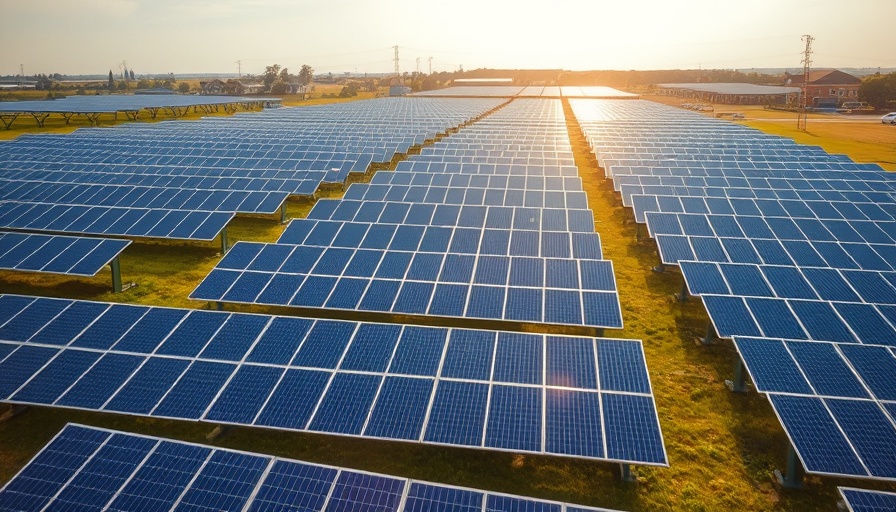
The Energy Demand Shift: Understanding the AI Surge
As artificial intelligence (AI) technologies continue to evolve, their expanding power consumption is reshaping the energy landscape across the United States. With data centers at the heart of this transformation, the frantic race to meet surging energy demands poses serious questions for both state policymakers and businesses. In Houston, a city renowned for its vibrant energy sector, these challenges are particularly pronounced, highlighting the need for a strategic reevaluation of energy infrastructure and emissions targets.
Houston's Data Center Boom: An Economic Catalyst
Houston is rapidly emerging as a critical hub for data centers, driven by an increase in cloud computing, e-commerce, and the burgeoning demand for AI processing power. According to the latest reports, the data center industry is expected to contribute significantly to the Houston economy, creating jobs and attracting investments. However, this growth does not come without its hurdles—the capacity constraints of the electrical grid are increasingly becoming apparent.
The Houston Chamber of Commerce has emphasized the importance of addressing these energy demands to maintain the city’s competitive edge. A failure to adapt could stifle growth, making it imperative for stakeholders to rethink current energy plans and explore sustainable options that ensure a reliable power supply.
Future Predictions: Houston’s Energy Landscape
Experts predict that if these trends continue, energy consumption from data centers could force state officials to revise emissions targets significantly. Such policy shifts are not merely regulatory adjustments; they necessitate a collaborative approach that involves energy companies, government bodies, and business leaders to innovate solutions that align with economic growth.
For example, the integration of renewable energy sources, like solar and wind power, into the existing grid could offer a dual benefit: meeting the energy needs of data centers while reducing carbon footprints. Forward-thinking companies have started exploring alternatives, emphasizing that a transition to green business practices will not only fulfill ethical responsibilities but also attract consumers and investors alike.
Counterarguments: Balancing Growth and Sustainability
Nevertheless, some stakeholders raise concerns about the rapid expansion of data centers and its environmental implications. The paradox of supporting economic growth while striving for sustainability leads to intense debates concerning land usage, emissions, and conservation efforts. Critics argue that the focus on AI and technology could lead to neglected infrastructure in other vital areas.
As Houston navigates these complexities, diverse perspectives illustrate the need for a balanced approach. The challenge lies in integrating advanced technological capabilities without jeopardizing environmental standards or quality of life for its residents.
Economic Benefits of Sustainable Practices
Harnessing AI to enhance energy efficiency can provide substantial economic incentives for businesses in Houston. By adopting smarter technologies that optimize energy consumption, companies can lower operational costs and contribute to a more stable energy grid. Investing in energy-efficient data centers can bolster business profits while promoting environmental accountability.
Moreover, as businesses increasingly adopt AI in operations, there will be demand for a skilled workforce adept in both technology and sustainability. This opens the door for educational institutions and training programs, potentially becoming a focal point of Houston’s job market trends.
Local Implications and National Trends
The situation within Houston parallels national trends as cities across the U.S. confront similar challenges. The exploding demand for data centers is pushing many states to think critically about their energy strategies. Issues such as grid reliability, environmental compliance, and economic incentives will repeat in various locales, making Houston’s approach a potential case study.
Understanding these dynamics will allow other cities to learn from Houston’s experiences and potentially foster innovative solutions that encourage a cleaner environment while supporting robust economic growth.
Moving Forward: Preparing for Change
The urgency surrounding the energy demands of AI-driven technologies highlights a transformative era in both technology and energy sectors. Houston stands at the forefront of this change, poised to either lead the way in sustainable development or become mired in energy constraints.
To meet these demands head-on, Houston must leverage the collective expertise of its corporate leaders, government officials, and environmental advocates to build a resilient energy infrastructure that prepares for the AI future. Embracing change and innovation will be crucial to fostering a thriving business climate and a sustainable future.
 Add Element
Add Element  Add Row
Add Row 



Write A Comment